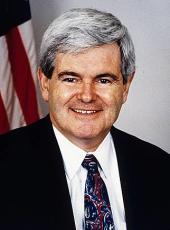Originally posted on HumanEvents.com
By Newt Gingrich
When, in 1492, Christopher Columbus and his crew sailed from Spain in a few crowded ships into an unknown horizon, they hoped to discover a trade route to India. They hit instead on a continent of new opportunities. Columbus's accidental discovery opened a permanent passage across the Atlantic and redrew the map of the world.
Millions of people have followed Columbus in the centuries since, many of them also boarding cramped ships and casting off on a dangerous trip to a place they had never seen, leaving their old lives behind. Others have come more recently, by air or over land. Even those who preceded Columbus by many centuries once came from somewhere else, in search of a place to settle down. The leap to this continent required incredible bravery from all new Americans from Columbus, from those seeking a better life, and from those fleeing persecution. Of course, some of those who came here were brought against their will, but that did not prevent their descendants from making contributions as well.
As we celebrate Columbus's discovery this week, we should also recall how the rest of us got here. Columbus Day, as Peter Roff noted at US News, is an opportunity to remember that most of us are descendants of people who came to America as immigrants, whether generations ago or only recently.
The early pilgrims were immigrants by another name, in search of freedom to practice their religion as they saw fit. Some of America's greatest cities began as their modest settlements of flimsy shelters barely able to weather the harsh winters. In the centuries that followed, these towns became bustling industrial cities as more immigrants from all over the world came to start new lives here in the United States. Like the pilgrims, many of these Americans, too, met a cold reality when they arrived, in which, with great effort, they tried to create opportunities for themselves and their children.
Our history is crowded with people who came to America and achieved what was not possible at home. For millions of immigrants, America has meant a life freer and more prosperous than they had before. And individually, they have made historic contributions to this country. Albert Einstein, one of our greatest scientists, immigrated from Nazi Germany. Sergey Brin, a founder of Google, came here from the Soviet Union. I. M. Pei, one of our greatest architects, was born in China. Alexander Graham Bell, Irving Berlin, Cary Grant, Bob Hope, and Madeleine Albright all immigrated to the United States.
From the beginning, being an American has meant striving to form a nation of people from such different origins as these. These immigrants and many others brought with them cultures and ideas that shaped our society profoundly. At times, these interactions have been far from perfect. But starting with the earliest settlers, the trend has been toward greater recognition of individuals' equal rights to life, liberty, and the pursuit of happiness.
Native Patuxets helped the Pilgrims survive their first winter in Massachusetts. Roger Williams, an immigrant who founded Rhode Island as a haven of religious liberty, lived for months in the homes of the Wampanoags and later bought the colony's land legally from the Narragansetts.
Centuries later, other groups, notably African Americans and Irish Americans, struggled to be equal members of our society. Today, their youngest descendants have trouble imagining a life in which they wouldn't be welcomed as fellow citizens.
In some European countries, it is not uncommon for immigrants' descendants to live several generations without being accepted as equal participants in society. Citizenship for their children is often not automatic. In America, however, the children of immigrants are frequently hard to distinguish from those whose families have been here for generations. It's easy to forget how remarkable that is. Welcoming millions of immigrants from all over the world and, through liberty, melding these diverse origins into a single nation is one of the great achievements of our history.
We should embrace immigrants who follow our laws and come here legally to seek a better future. They have made the choice to embrace America, and the individual freedom it offers, with their whole lives. Without these immigrants, we would be a poorer country. Most of us, in fact, wouldn't be here at all.
Newt Gingrich, Gingrich Campaign Press Release - Columbus Day and Voyages That Defined America Online by Gerhard Peters and John T. Woolley, The American Presidency Project https://www.presidency.ucsb.edu/node/298585

